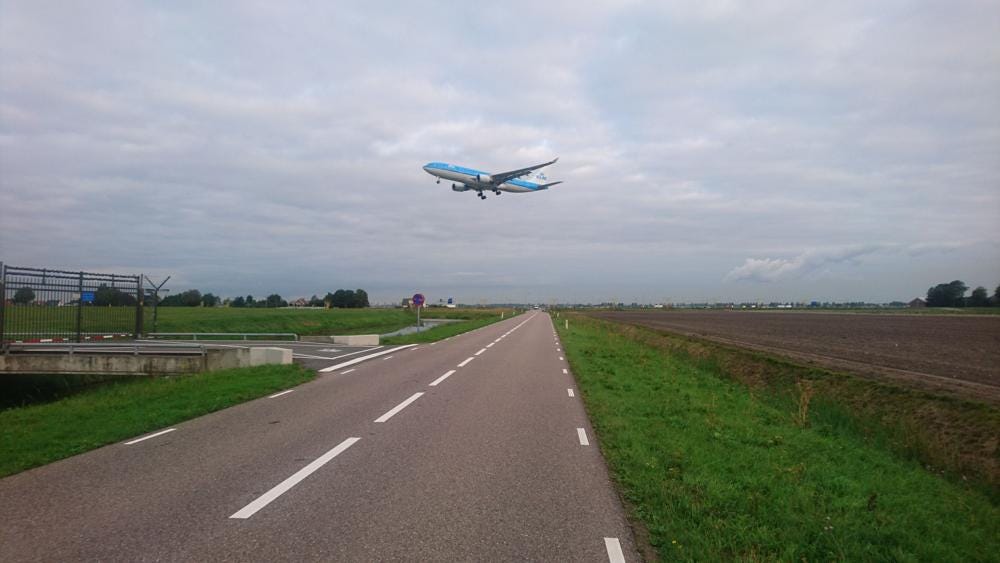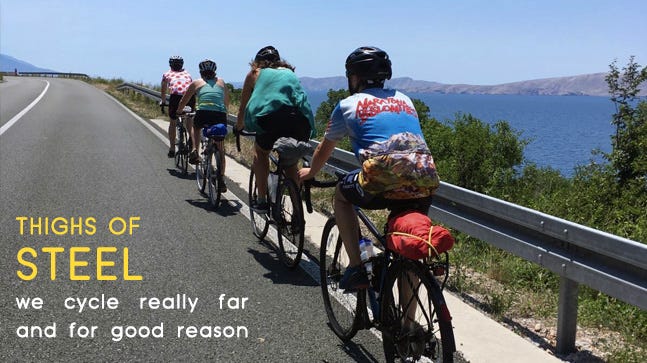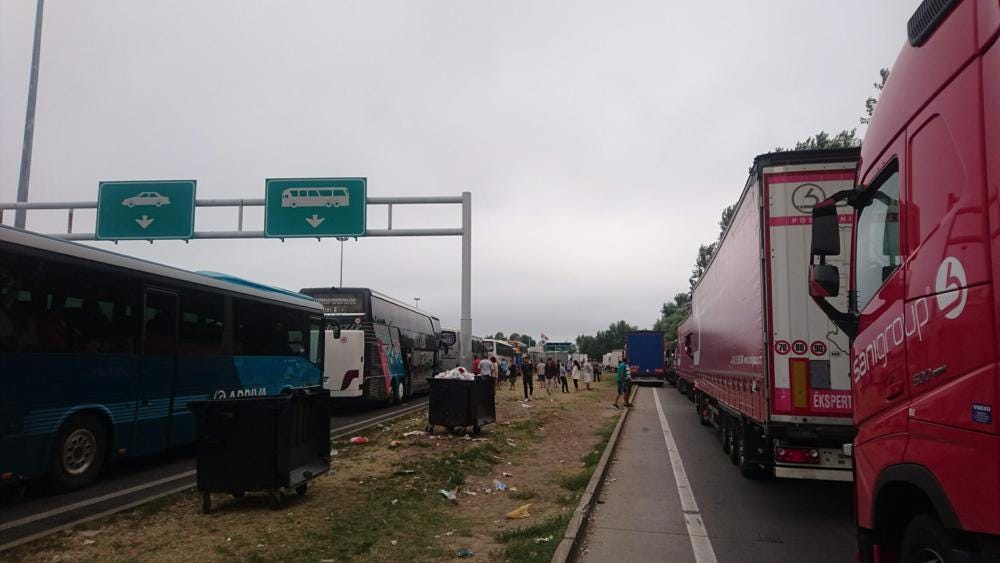#92: Why I Travel Slow + Borders + The Victor Frankl Book Cult

Happy Friday!
I'm a slow traveller. I've taken only one return flight in the last 8 years - and that was to prove to myself that I wasn't not flying out of pride or habit.
So while the other Thighs of Steel cyclists packed up their bikes and drove out to Sofia airport for a three-hour flight home, I cycled down to the bus station for the first leg in a journey that took three days.
Sounds slow, right?
But 'slow' is a relative concept. Taking only 3 days to cross a continent is still pretty quick, when you think about it. The relentless wheel-turning of the Thighs of Steel crew took 5 weeks to make the journey from London to Sofia. If I'd walked, the 2400km hike might have taken 100 days.
One of my favourite bits of stand up is by disgraced comedian Louis CK (proof you can do gross things and still be funny). You can usually find it pirated online under the title 'Everything is amazing and nobody's happy'.
It's really worth watching the whole thing, but this is the excerpt that's pertinent to the experience of slow travel:
People say there's delays on flights. Delays? Really?! New York to California in 5 hours. That used to take 30 years - and a bunch of you would die on the way there, and have a baby. You'd be a whole different group of people by the time you got there!
Now you watch a movie and you take a dump and you're home.
I didn't die, give birth or watch any movies on my transcontinental voyage, but I did take about 6 dumps en route home - and that's exactly as it should be.
Travelling the slow way meant that I could unwind my cycling legs, make new buddies during an 8-hour border crossing, browse the secondhand bookshops of Budapest, relax for a couple of hours in a hot spring spa, ride across the cycling paradise that is The Netherlands, shop for cheese in Den Haag, play two-truths-and-a-lie with fellow tourers on the ferry, and finally cadge a lift in a van heading west to home.
For me, that doesn't sound like a slow journey, and the 8-hour border crossing didn't feel like a delay. It's something else. It's something that I think is well worth the time and the money it costs me because it's something I enjoy far more than simply 'getting there'.

Thanks SO MUCH to everyone who has put money into the Khora pot. If you need proof, you can find it on Strava / my tanlines / mosquito bites / steely thighs.

Crossing the Border [An Excerpt]
If the wind changes direction, this man is in deep trouble. His mouth is so firmly down-turned that I wonder how he feeds himself.
He shoves out his hands, and I take two steps back. He stares at me, my little wine-red book on his counter.
The muscles in his face are drawn taught, toughness without any sign of strain. Only his eyes move: up and down, up and down, up and down, up and down. Matching photo to face, face to photo.
He flicks through the document, then slides it into a machine and stares expressionless at his monitor.
He returns to my face and my photograph. Except for his eyeballs, his face is completely frozen – do they teach that in border control school?
Continue reading...
>> INPUT
Reading a book might well be the best way to reduce your stress levels, if a 2009 study commissioned by Galaxy chocolate can be trusted...
The above research was cited in the following article: Why Everyone Should Watch Less News And Read More Books Instead by Ryan Holiday - an excellent piece, no matter how the research was funded.
"The Dutch city of Helmond plans to reward motorists who stick to the speed limit with cash for community projects there." And, like a lot of Dutch social innovations, it seems to be working. Article from Positive News.
It takes 200 hours of contact to make a close friend. A well-researched article from Ben Healy at The Atlantic.
OUTPUT >>
Crossing the Border (August)
Thighs of Steel: Ljubljana to Sofia (August)
...COMING UP...
Recovery and catch-up.
On Tuesday, one of my bestest friends is playing keyboard at the TV recording of Amusical, a show where comedians sing songs from musicals. Tickets are free!
UK Ultimate Beach Nationals next weekend, so lots of training?

Now On: The Victor Frankl 5-a-day Book Club!
Membership Criteria: Read 5 pages a day of Man's Search for Meaning to complete the whole darn text in only 28 days. I'll be tootling through the text at just 5 pages a week, so you've got plenty of time to catch up online.
Day 18
Today's pages (p91-96) address the psychology of the camp guard, and the psychology of the prisoner after his liberation from a concentration camp.
With regards to the guards, Frankl makes four observations:
Some of the guards were pure sadists.
These sadists were always chosen when severe treatment was ordered.
The majority of guards were 'morally and mentally hardened men' who refused to take active part in sadistic torture, but did not prevent others from such behaviour.
There were some guards who took pity on the prisoners and took active steps to ameliorate conditions for them. 'Human kindness can be found in all groups, even those which as a whole it would be easy to condemn.'
This fourth category contrasts especially sharply with the occasional prisoner who was abusive towards his fellow inmates.
'Certainly, it was a considerable achievement for a guard or foreman to be kind to the prisoners in spite of all the camp's influences, and, on the other hand, the baseness of a prisoner who treated his own companions badly was exceptionally contemptible.'
These observations lead Frankl to divide humanity into two halves.
'[T]here are two races of men in this world, but only these two- the 'race' of the decent man and the 'race' of the indecent man. Both are found everywhere; they penetrate into all groups of society.'
~
When the camps were finally liberated, the extreme stress of imprisonment was replaced by 'total relaxation'. 'But,' Frankl writes, 'it would be quite wrong to think that we went mad with joy.'
As the prisoners took their first steps outside the camp as free men, Frankl writes that '[e]verything appeared unreal, unlikely, as in a dream'.
'"Freedom" - we repeated to ourselves, and yet we could not grasp it. We had said this word so often during all the years we dreamed about it, that it has lost its meaning.'
At the end of that first day of freedom, the prisoners asked one another whether they felt pleased at their release.
'[T]he other replied, feeling ashamed as he did not know that we all felt similarly, "Truthfully, no!" We had literally lost the ability to feel pleased and had to relearn it slowly.'
Frankl calls this dreamlike mental state 'depersonalisation' and is summed up by the inability for the prisoners to trust their reality: '[N]ow the dream had come true. But could we truly believe in it?'
In contrast, the body wasted no such time in disbelief: 'It began to eat ravenously, for hours and days, even half the night.' The prisoners' eating was soon accompanied by a similar appetite to tell their story.
'The pressure which had been on his mind for years was released at last. Hearing him talk, one got the impression that he had to talk, that his desire to speak was irresistible.'
And, finally, after so much talking, the mind was slowly released from its prison.
'Many days passed, until not only the tongue was loosened, but something within oneself as well; then feeling suddenly broke through the strange fetters which had restrained it.'
---
We continue next week...
Much love,
- dc
CREDITS
David Charles wrote this. David is co-writer of BBC Radio sitcom Foiled, does copywriting for The Bike Project and is almost always available for work. davidcharles.info // @dcisbusy

A journey of 2,300km begins with the first bus.


